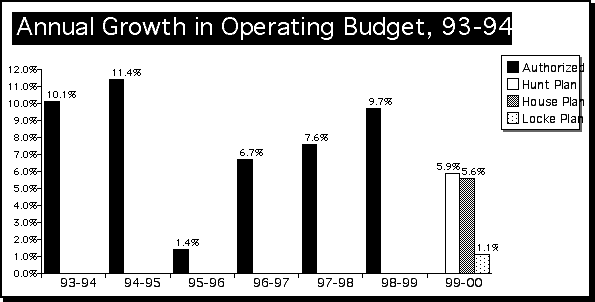Like Gov. Jim Hunt before them, House budget architects appeared willing to whistle past the graveyard in their preparation of a spending plan for the 1999- 2001 biennium. No funds are scheduled even to begin payment of a court-ordered repayment of $360 million in illegally collected intangibles taxes. As such, the proposed House budget — like the administration’s before it — is likely to turn out to be incomplete and infeasible given the state’s inescapable fiscal obligations.
In operating expenditures (excluding capital and off-budget items), General Fund authorizations under the House Committee plan will rise 5.6 percent in FY 1999-00 and 4.1 percent in FY 2000-01. Since 1992, annual increases have averaged 8.8 percent, rising rapidly in all but one fiscal year (1995-96) and reaching 9.7 percent in FY 1998-99. The House’s proposed 5.6 percent hike in FY 1999-00, while below North Carolina’s average spending growth during the 1990s and slightly lower than the governor’s proposed 5.9 percent, still represents a growth rate significantly higher than inflation (2.2 percent) and growth in the state population (1.3 percent). Continued sizable growth in state spending, even in the face of this year’s fiscal uncertainty and nonrecurring funds gap, is a trend that does not augur well for the future.
Specific budget items are also troubling. Last year, the General Assembly finally got rid of an $8 million fund in Cultural Resources and $4 million fund in Human Resources, both used as pork-barrel accounts to finance local organizations outside the normal administrative process. The proposed 1999-2001 budget restores these funds. Also, in 1998 the legislature declined to fund a $250,000 study to prepare for comprehensive local land-use planning imposed by the state. This year’s budget includes a $200,000 research line-item to pave the way for this unwise policy change.
Another poor idea can be found in the UNC system budget. The House proposal would eliminate the token 5 percent of overhead receipts from research grants that now goes to UNC General Administration for operations. UNC-Chapel Hill and N.C. State would keep the entire amount. This follows a phase-out since the early 1990s of the amount of overhead receipts dedicated to offsetting General Fund operating support. At one time, fully half of all overhead receipts were shared with the General Fund — a way of compensating taxpayers for paying for the buildings, equipment, and other infrastructure that allowed university researchers to win research grants. Instead of eliminating the last vestiges of this system, the legislature should over time restore overhead-receipts transfers to the General Fund, saving taxpayers about $40 million.
The House’s Good Ideas
The House Committee did accept several important ideas from the Locke Foundation’s Changing Course III budget. One was to use excess funds in the state retirement system to help offset rising costs in the state health plan. The House budget saves $151 million by using retirement reserves to pay premiums for retiree health coverage for General Fund and Highway Fund employees in FY 1999-00, temporarily offsetting recurring increases in taxpayer support for the health plan ($100 million in 1999-00, $135 million in 2000-01) and a new prescription drug card program for state employees ($11 million and $13 million, respectively) no doubt added as a sweetener to reduce opposition to the deal from labor unions.
Another Locke proposal partially implemented in the House proposal is a series of tuition increases for the UNC and community college systems. These are justified on several grounds: 1) increased user responsibility for public services, 2) reduction in the regressive nature of compelling the majority of North Carolina workers to substantially foot the bill for college students whose family income and future earnings far exceed that of the median worker, and 3) the need to focus attention at UNC schools clearly on the education of undergraduates. The budget calls for a 4.9 percent tuition hike for in-state UNC students and a similar increase for out-of-state students, with graduate students paying between 6.9 percent and 9.4 percent more. It also calls for a $95 per semester rate increase for community colleges. The combined taxpayer savings is $26 million.
A preliminary review of the budget proposal shows at least $100 million in questionable new operating spending for corporate welfare, pork-barrel accounts, entitlement expansions, and programs best funded by local government or the private sector. An additional $13 million is budgeted for low-priority capital projects such as museums and farmers’ markets. In total spending (including capital and off-budget items), the House budget would add $524 million to the budget in 1999-00 — about $218 million more than that called for in the Locke Foundation’s alternative budget, which included $354 million in intangibles tax refunds. Lastly, the only tax relief in the House package is a modest $9 million from expanding the homestead exemption from local property taxes for some elderly and disabled households. Locke proposed $512 million in tax relief.
John Hood, President





